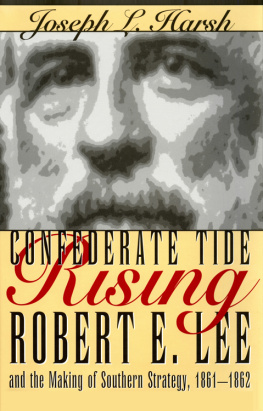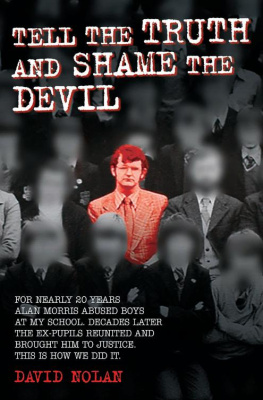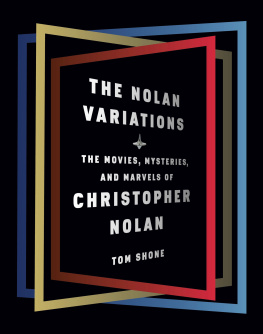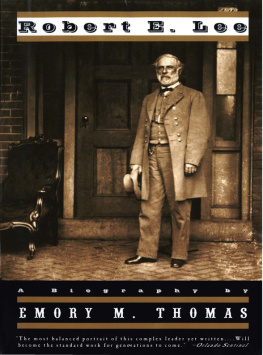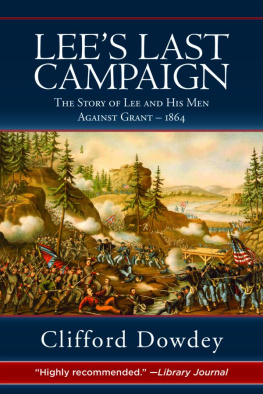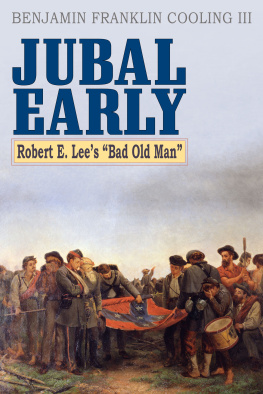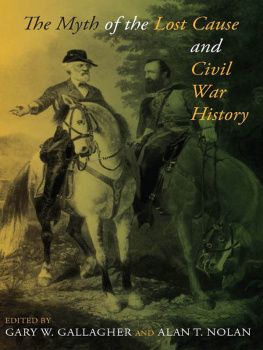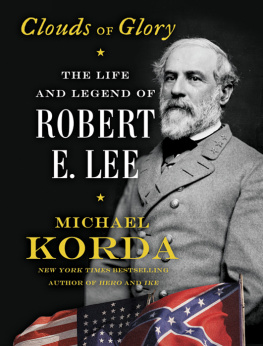Preface
It behooves me, in setting forth an unorthodox consideration of Robert E. Lee, to state precisely what I am attempting to do.
I believe that Robert E. Lee was a great man able, intelligent, well-motivated and moral, and much beloved by his army. He did what he believed to be right. On the other hand, I have long been uncomfortable with certain aspects of the Lee tradition. I suspect that this discomfort has several sources. Without revealing too much about myself, I acknowledge that a parochial grade school education may have provoked in me a perverse skepticism of lives of the saints. Lincoln scholar Don E. Fehrenbacher characterizes the idealized Lincoln as insufferably virtuous a characterization that I can appreciate.
In the case of Lee my discomfort has been more specific. Certain of the unqualified images presented in the Lee tradition have not fit, it seemed to me, with some of the facts of Lees life. He was supposedly antislavery but was a Virginia aristocrat of the planter class who fought vigorously for a government expressly based on slavery. He was a lifetime soldier in the United States Army, a patriot sworn to defend his country, and he opposed secession; yet he seceded and made war on the United States. He was a master strategist and tactician but was so committed to the offensive that he suffered grievous and irreplaceable losses that progressively limited the viability of his army. He was magnanimous toward the North but fought bitterly and aggressively against it. He was kind and protective of his soldiers but regularly risked their lives in daring offensive strokes, ordered the July 3 attack on Cemetery Ridge, and continued the war long after a Southern victory was possible. He was conciliatory after the war yet categorical in his defense of what the South had done and outspokenly critical of the Norths postwar treatment of the South.
This book is an effort to rationalize these conflicting pictures of Lee. In the process of examining Lees career, I have necessarily confronted a number of broader issues of Civil War history, and I have examined these, too. In short, while I admire Lee, I question certain aspects of the Lee tradition; and, having raised certain questions about that tradition, I cannot answer them adequately without relating the Lee tradition to Civil War history generally.
This book is not, therefore, a biography and offers no full account of Robert E. Lees life. It is, instead, an examination of major aspects of the tradition that identifies Lee in American history. In raising questions and drawing conclusions about this tradition, I have attempted to set forth the evidence. The reader who thinks I am asking the wrong questions or disagrees with my conclusions may, in evaluating my thesis, consider the evidence on which it is based. This evidence does not include any new or sensational facts or new primary materials. On the contrary, my inquiry concerns what the familiar and long-available evidence actually establishes about Robert E. Lee. The results of my inquiry are not so much an expos as simply an attempt to set the record straight.
Anyone who questions traditional views of Robert E. Lee must acknowledge a debt to Thomas L. Connelly and his 1977 book, The Marble Man. Connelly proved that one can criticize the general and live to tell the tale. I admit this debt, but my effort is quite different from Connellys. The Marble Man is an intellectual history of the Lee tradition, tracing its development and describing how and why Lee became such a heroic figure. In addition, the book features a psychohistory of Lee, an attempt to explain the man in terms of his life experiences. In making this effort, Connelly touches on several aspects of the Lee tradition with which I am concerned, but he does not systematically analyze even those aspects. My book examines the major aspects of the Lee tradition in detail. I am concerned with the merits of those major aspects, that is, I question the historicity of the tradition.
I am indebted, as a writer always is, to many persons. Unable to identify all of them, I state special thanks to Eileen Anne Gallagher of State College, Pennsylvania; Roger Hogue of North East, Pennsylvania; Carolyn Autry, Tom Krasean, Raymond L. Shoemaker, Leigh Darbee, and Peter T. Harstad of the Indiana Historical Society; Jim Trulock, Alice Rains Trulock, and Peter S. Carmichael of Indianapolis; Patrick S. Brady of Seattle; Maj. Thomas J. Romig of the Judge Advocate Generals Corps; Ted Alexander of the National Park Service; A. Wilson Greene of Fredericksburg, Virginia; Marshall D. Krolick and C. Robert Douglas of Chicago; Dudley Bokoski of Mayodan, North Carolina; Professor Lloyd Hunter of Franklin College; James K. Flack and Curt and Arden Poole of Detroit; Robert B. Clemens of Indianapolis; Mark Silo of Albany, New York; David Smith of Cincinnati; Sara B. Bearss of the Virginia Historical Society; and Alan and Maureen Gaff of Fort Wayne, Indiana. My secretary, Brenda Reed, has helped all along the way, and my wife, Jane, has given valuable editorial assistance. Although Professor Gary W. Gallagher of Penn State bears no responsibility for the imperfections of this book, his wisdom, scholarship, judgment, and encouragement have been critical to its completion.
A final word. When I have had conversations with persons interested in my subject, almost invariably these persons have, upon sensing that my questions and conclusions do not square with the Lee tradition, suggested that I dislike Lee or do not believe him to have been a great man. It seems to me that there is a human tendency to deal simplistically with the figures of history, to classify them as good guys or bad guys rather than to analyze and evaluate them in detail. I reject this unhistoric approach. Lee was, after all, one of us, a human being. I do not deny Lees greatness, but I have tried to deal with him as a human being. And I conclude as I began, believing him a great man but, indeed, a man. I offer this book as a corrective of the Lee tradition.


